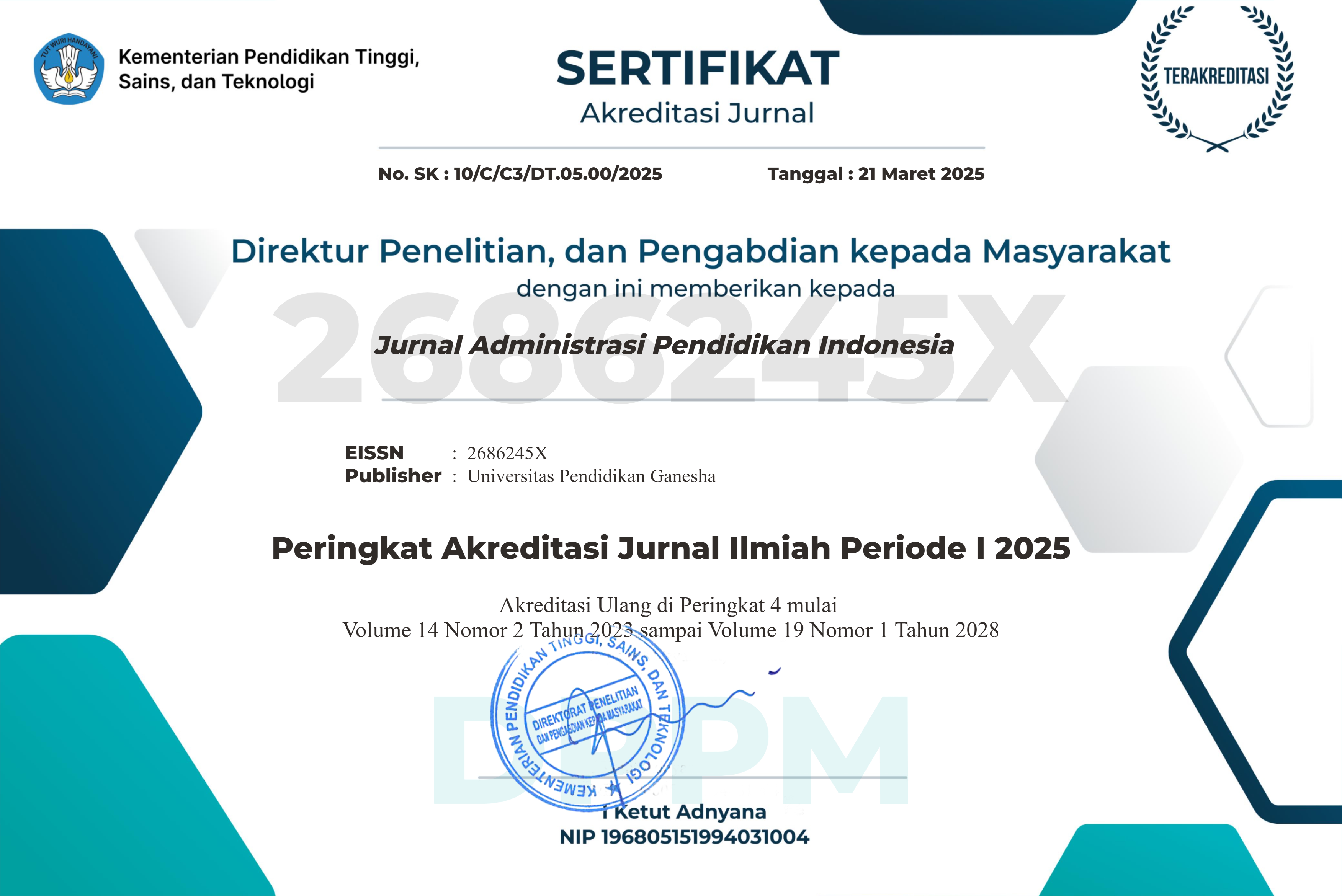Contribution of Situational Leadership, Academic Supervision, Work Climate and Work Motivation to Organizational Commitment of Teachers in Senior High Schools in Mendoyo District
DOI:
https://doi.org/10.23887/jurnal_ap.v13i2.1744Keywords:
situational leadership, academic supervision, work climate, work motivation, teacher organizational commitmentAbstract
This study aims to determine the magnitude of the variable contribution of situational leadership, academic supervision, work climate, and work motivation to the organizational commitment of high school teachers in the Mendoyo District. This type of research is ex post facto with multiple linear regression analysis designs. The population in this study amounted to 86 people. The entire population is used as a research sample, so this is a population study. The data was collected using a closed-choice questionnaire using the Sala Likert model. The results of this study indicate that (1) there is a contribution of situational leadership to the organizational commitment of 15.46%, 2) there is a contribution of academic supervision to teacher organizational commitment of 38.34%, (3) there is a contribution of work climate to teacher organizational commitment of 5.89% (4) there is a contribution of work motivation to teacher organizational commitment of 13.08% (5) there is a simultaneous contribution to situational leadership, academic supervision, work climate, and work motivation to teacher organizational commitment of 72.77%.
References
Danuri, S. M. (2019). Metode Penelitian Pendidikan. Yogyakarta: Samudra Biru (Anggota IKAPI).
Glickman, C.D., Gordon, S.P., and Ross-Gordon, J. M. (2007). Supervisionand Instructional Leadership A Development Approach. Seventh Edition. Boston: Perason.
Hawkins & Shohet, R. (2006). Supervision in the Helping Professions. USA: The McGraw-Hill.
Hersey, P., & H, B. K. (1986). Manajemen Perilaku Organisasi: Pendayagunaan Sumber Daya Manusia. Pener-jemah Agus Dharma. Edisi Keempat. Jakarta: Erlangga.
Hoy, W. K., & Miskel., C. G. (2005). Educational Administration. New York: McGraw Hill.
Jones, H. (1998). Management Kontemporer. Jakarta: PT. Raja Grafindo.
Karsh, B., B. C. B. and F. S. (2005). Job and organizational determinants of nursing home employee commitment, job satisfaction and intent to turnover. Ergonomics, 48(1), 1260–1281. https://pubmed.ncbi.nlm.nih.gov/16253944/
Kreitner R, K., & Angelo. (2000). Organizational Behavior 8th Ed. New York. The McGraw-Hill Companies. Inc.
Kustianto, F. dan A. A. I. (2015). Pengaruh Iklim Organisasi Terhadap Komitmen Karyawan dengan Kepuasan Kerja sebagai Variabel Intervening Pada PT Garam (Persero). E-Jurnal Ilmu Manajemen MAGISTRA, 1(1), 42–45. https://jurnal.narotama.ac.id/index.php/magistra/article/view/24
Lubis, M. J., & Jaya, I. (2019). Komitmen Membangun Pendidikan: Tinjauan Krisis Hingga Perbaikan Menurut Teori. Medan: Widya Puspita.
Luthans, F. (2006). Perilaku Organisasi. Edisi Sepuluh. Yogyakarta: PT. Andi.
Mowday, & T, R. (1982). Employee – Organizational Linkages: The Psychology Of Commitment Absentism And Turnover. Academic Press Inc.
Mukece, J. (2012). Influence of Leadership Style on Academic Staff Retention in Public Universities in Kenya. International Journal of Business and Social Science, 2(21). https://ijbssnet.com/journals/Vol_3_No_21_November_2012/31.pdf
Muriman, C., Idrus, M. S., Thoyib, A., dan M. (2008). Pengaruh Budaya Organisasi Dan Stres Terhadap Komitmen Organisasi Dan Kepuasan Kerja (Studi Di Kepolisian Negara RI Sektor, Kepolisian Negara RI Daerah Jawa). Jurnal Aplikasi Manajemen, 6(1), 21–31. https://jurnaljam.ub.ac.id/index.php/jam/article/view/1877
Muwahid, S. (2012). Supervisi Pendidikan. Surabaya: Acima Publishing.
Nanba, Mineko., Y. Y. and K. N. (2012). Organizational climate, organizational commitment and intention to leave among hospital new nurses in japan. Okayama Prefectual University of Health and Welfare Bulletin, 19(1). https://core.ac.uk/download/51452130.pdf
Nawawi, H. (2003). Kepemimpinan Mengefektifkan Organisasi. Cetakan Pertama. Gadjah Mada University Press.
Noordin, Fauziah, Safiah Omar, S. S. and S. I. (2010). Organizational Climate And Its Influence On Organizational Commitment. International Business & Economic Research Journal, 9(2), 1–10. https://www.researchgate.net/publication/296471216_Organizational_Climate_And_Its_Influence_On_Organizational_Commitment
Rahimic, Z. (2014). Influence Of Organizational Climate on Job Satisfaction in Bosnia and Herzegovina Companies. International Business Research, 6(1), 129–139. https://ccsenet.org/journal/index.php/ibr/article/view/24224
Robbins, S. P., & Coulter, M. (2010). Manajemen Edisi Kesepuluh. Manajemen Edisi Kesepuluh, 36.
Russel, E. M., Williams, S. W., and Gleason-Gomez, C. (2010). Teachers’ perceptions of administrative support and antecedents of turnover. Journal of Research in Childhood Education, 24(3), 195–208. https://www.researchgate.net/publication/254311753_Teachers’_Perceptions_of_Administrative_Support_and_Antecedents_of_Turnover
Sa’ud, A. (2013). Instrumen Perangkat Pembelajaran. Bandung: Remaja.
Sugiyono. (2018). Metode Penelitian Kombinasi (Mixed Methods). Bandung: CV Alfabeta., 1–5.
Sujanto, B. (2018). Pengelolaan Sekolah Permasalahan dan Solusi. Jawa Timur: Bumi Aksara.
Sungkono. (2006). Pengaruh Budaya Orga-nisasi, Motivasi terhadap Komitmen Karyawan dan Kinerja Perusahaan Study Pada PT Dupont. Universitas 17 Agustus 1945.
Wahjosumidjo. (2013). Kepemimpinan Kepala Sekolah: Tinjauan Teoritik dan Permasalahannya. Jakarta: PT. Raja Grafindo Persada.
Wahyudi, & Salam, R. (2020). Komitmen Organisasi (Kajian: Manajemen Sumber Daya Manusia). Banten: UNPAM Press.
Wahyuni, I. W., & Djamaludin, A. (2004). Hubungan Antara Persepsi Gaya Kepemimpinan Situasional Dan Efektivitas Komunikasi Interpersonal Dengan Komitmen Kerja Studi Kasus Pada Perawat Di Rumah Sakit Siti Khodijah Sepanjang Sidoarjo Jawa Timur. Jurnal Sosiosains, 17(2). http://etd.repository.ugm.ac.id/penelitian/detail/21540











